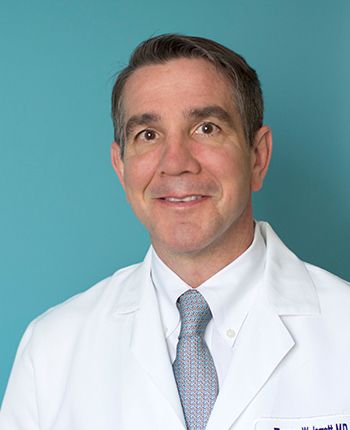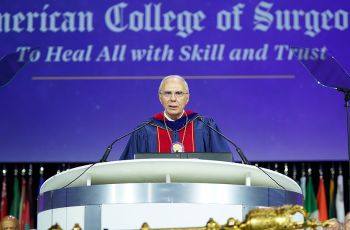
Close to 15% of men are in poor health, according to the Centers for Disease Control and Prevention, making June, Men’s Health Month, a fitting time to prioritize care for a population sometimes reluctant to get regular check-ups. Thomas Jarrett, MD, chair of the Department of Urology at the George Washington University Medical Faculty Associates (GW MFA), explains what men need to be on the lookout for with their urologic health and how the GW MFA is ahead of the care curve with innovative treatments.
Q. What are the top health concerns for men, especially when it comes to urologic concerns?
Jarrett: The number one health concern is prostate issues, whether it be an enlarged prostate or prostate cancer. Number two is sexual function.
Q. Who is at the highest risk of dealing with prostate issues?
Jarrett: For prostate cancer, family history is very important. In Washington, D.C., the Black population is at higher risk for prostate cancer. The most important thing, especially for high-risk patients, is to get annual testing, according to the guidelines of the American Urological Association.
Q. At what age should men start getting prostate screenings?
Jarrett: High-risk people, those with a family history and Black men, need to get screenings starting at age 40. For those not in the high-risk group, they should get screened starting at age 50.
Q. What else can men do to stay on top of their health?
Jarrett: Visit your primary doctor every year; that's really important. Take care of your general health as it relates to sexual dysfunction. A lot of the time, for younger men, sexual dysfunction is an early warning sign for other health problems like cardiovascular disease, hypertension, and other issues.
Q. The Department of Urology at the GW MFA now has aquablation therapy for patients with prostate issues. What should patients know about it?
Jarrett: There are two big health concerns for men: one is prostate cancer, and the other is benign enlargement of the prostate. With benign enlargement, or BPH, men get frequency urgency, including waking up at night, and a decreased force stream. Aquablation is one of the newest treatment choices for BPH. It’s highly effective and has the lowest risks of sexual dysfunction, whether it's erectile dysfunction or ejaculatory dysfunction.
Q. What is the experience like for men who have this therapy?
Jarrett: Men who receive this therapy are already experiencing an enlarged prostate. When the prostate gets enlarged, it starts to pinch off the urethra and the flow of urine. The ablation opens up that channel. It uses forced water in a computer-generated device, so you're getting very accurate removal of the tissue without using energy sources. A lot of the traditional methods used either laser or electrocautery approaches. These have a lot of heat and can subsequently have a high chance of injuring the nerves and also impairing healing afterward. Aquablation technology achieves the same goal of opening up the channel but has the lowest side effect profile of any of the modalities that we have now.
Q. How long does it take to recover from aquablation?
Jarrett: Most people go home the same day or the next day, and they can get back to fairly normal activity in a couple of weeks.
Q. Are there any other urologic issues men should know about?
Jarrett: Fertility is important, especially for younger men. For older men, health concerns are about enlarged prostates, prostate cancer, and sexual dysfunction, but for younger men, infertility is a very big concern. We are the only place in the city that has a specialized infertility expert. Patients experiencing infertility don’t need a referral to see us; they can call and make an appointment.
If you have urologic concerns, or if you’d like to learn more about aquablation therapy, make an appointment with GW Urology by calling (202) 741-3100 or emailing uroappointment [at] mfa [dot] gwu [dot] edu (uroappointment[at]mfa[dot]gwu[dot]edu).



